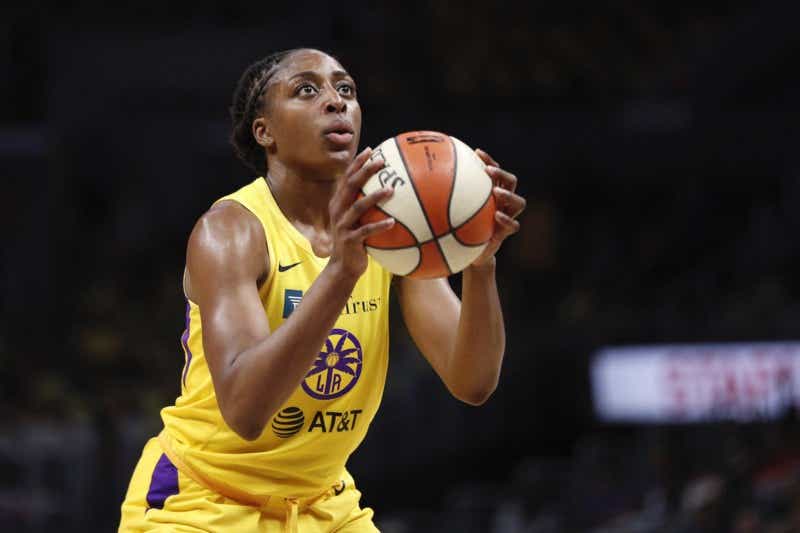“We can’t continue to assume that the answer is no. It’s no, if you don’t ask.”
For our motivation series this month, we’re highlighting those fighting for change at work. Up today: Nneka Ogwumike, a Los Angeles Sparks player and president of the WNBA Players Association. Nneka fought tirelessly for a historic bargaining agreement with the league that takes a “big bet” on women, with improved salaries and maternity leave policies. Here, we chatted with Nneka about what motivated her and other athletes to fight for change — and what message she hopes it sends other women.
Lisa Ryan, editor: First off, congratulations on this historic bargaining agreement. How long did this process take, and what were you fighting for?
Nneka Ogwumike: Oh, thank you. The process started back in 2018, when we opted out of our former collective bargaining agreement. There was a six year opt-out option and we decided to. Since then, up until about three weeks ago, we’ve been negotiating and finalizing the now-current CBA. We really just wanted to bet on ourselves and fight for others to bet on us as well.
An aspect of your agreement that’s really making headlines is the maternity leave policy that your organization was able to bargain. What message do you hope this sends to women and families?
I hope we’re not the only ones. But if we are in the front of the line, I really hope that this means that this will change a lot for resources for women in the workplace — not just women in sports. That was kind of an eye opener for us as we were negotiating; we didn’t realize that there were so many women working that did not have this type of resource. If we set a tone on a national and global level for women in the workplace, we’re really proud of that.
What advice do you have for other people who want to stand up and fight for better conditions at work?
You can’t demand for anything you don’t ask for. There’s been a culture of silence for women in the workplace. We can’t continue to assume that the answer is no. It’s no, if you don’t ask. We have to empower each other. We can’t accomplish anything alone, especially for women. When we band together, that’s when we’re most powerful and we ask that change happens.
What made you want to go after a leadership position within the WNBA Players Association?
I never really went after any of the positions I’ve ever had, actually. I’ve always been either nominated without my knowledge — or I ran unopposed after a heavy suggestion that I should run. That’s kind of how I really fell into this, and I’ve assumed the role and the responsibility. I really love being in this position because I get to work with such amazing women. We have a group of seven in our executive committee, and we have an amazing staff at the WNBA. We’ve really stepped into this space where we can finally collaborate with the league, and it feels really good to do that.
One thing that’s pretty remarkable about the WNBA Players Association is not only that you are the president — but that your sister, Chiney Ogwumike, is vice president. What’s it like to work together to fight for better conditions for your fellow players?
It’s awesome being able to work with my sister. It’s fun to be able to discuss things outside of conference calls and being in the office. She provides a fresh perspective as well, because she’s so heavily in the media industry, that messaging has her expertise through all of this. I have been able to learn a lot from her through it, and I’m really happy that we’re able to share in this. And I think that I’m on all the many amazing things that you guys accomplished with this agreement.
Many people assume that professional athletes are in privileged positions — given some of the attention and glamour of the job. What are some things that people don’t understand about being a professional athlete?
The reality is that we work, too, even though we work in what you would call the entertainment industry. We sacrifice a lot of our time, just as anyone else who works. More specifically, a lot of people don’t know that we play full-time seasons — because we played overseas and in the WNBA. A lot that we’re really still working to fight for us to have is to treated as professional athletes are on the men’s side. We work the same as they do. We use our bodies and same that they do. We understand what our value is.
What do you hope this bargaining agreement means for the future of women in basketball?
I hope that it’s a stepping stone to the progress that we envision. When we negotiated this deal, we were really looking at the grand scheme of things. We were looking at every player. We weren’t looking at just players now — we were looking the future. We hope that we set the precedent for what future players can negotiate moving forward. We expect to see that change as we move on for this agreement.
This interview has been edited and condensed.
This originally appeared on Medium.com









